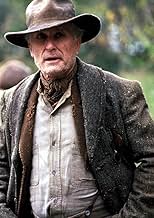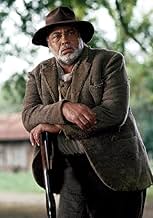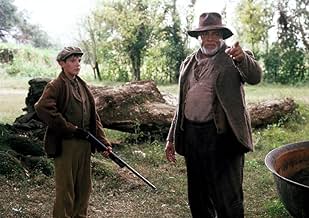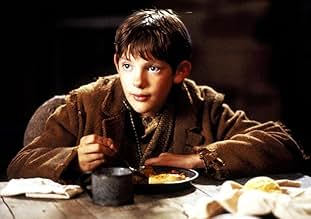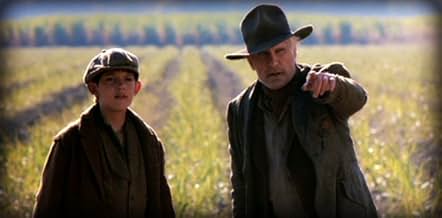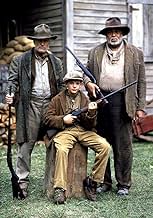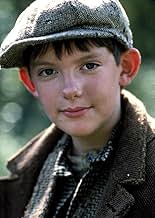Aggiungi una trama nella tua linguaHorton Foote's story of a teen-aged boy in the Depression who finds work on an eccentric's sugar plantation and learns life's surprising lessons from the team of convicts who also work there... Leggi tuttoHorton Foote's story of a teen-aged boy in the Depression who finds work on an eccentric's sugar plantation and learns life's surprising lessons from the team of convicts who also work there.Horton Foote's story of a teen-aged boy in the Depression who finds work on an eccentric's sugar plantation and learns life's surprising lessons from the team of convicts who also work there.
Bob Edmundson
- Overseer
- (as Robert Edmundson)
Recensioni in evidenza
Robert Duvall gives a creditable performance as the supervisor of a convict farm in 1902 Texas who befriends a young boy (Lukas Haas). The screenplay, written by Horton Foote, contrasts the difficulties of growing up and growing old. Duvall's character is senile and suffering ill health. He alienates himself from family and associates - except for a former convict assigned to his charge, the young boy who reminds him of his youth, and a couple who live in the village store.
It's a nice set piece, and the warm colors create a real feeling of turn-of-the-century South. While Duvall's character could have been fleshed out more, he does an excellent job as a man intent on dying on his own terms with help from his young charge
It's a nice set piece, and the warm colors create a real feeling of turn-of-the-century South. While Duvall's character could have been fleshed out more, he does an excellent job as a man intent on dying on his own terms with help from his young charge
Along with Robert DeNiro and Al Pacino, Robert Duvall brings to the screen the best film acting of our generation. Unlike the other two, he can shape a "typical" role into something original and unique. Through emotional shadings and nuance, Duvall has created a remarkable gallery of Southern characters, each individualized despite having many surface traits in common. Surely DeNiro and Pacino are highly skilled actors, but the best performances of each resemble one another to a fault. Duvall has made his share of potboilers and worse, yet his most substantial roles have generated performances of singular quality.
One of them is in "Convicts." The others? Don't miss "The Apostle," "Rambling Rose," "Tender Mercies," "Stars Fell on Henrietta," and "Tomorrow."
One of them is in "Convicts." The others? Don't miss "The Apostle," "Rambling Rose," "Tender Mercies," "Stars Fell on Henrietta," and "Tomorrow."
Robert Duvall is one of America's treasures. He should be given a Lifetime Achievement Award annually at the Academy Award ceremonies, and this film allows him to demonstrate, once again, how it's done. If you agree, by all means run, don't walk, to your nearest video store and rent "Rambling Rose", another of Duvall's gems...which, incidentally, also co-stars Lukas Haas, another underrated and terrific actor, as he shows in "Convicts". Most of Lukas' contribution is in the form of reaction to Duvall's ramblings, but the two of them, along with everyone else in the film, create a marvelous since of realism. Duvall is a mentally addled old drunk who can't remember that he said the same thing to you a few minutes ago, or what you told him, and it's to Duvall's credit that he manages to avoid being boring, as this sort of character so easily could have been. Duvall's character is also disreputable and mistreats the convict labor he has contracted for to work on his farm, but still you empathize with him. Lukas is, as always, wide-eyed (no one had larger eyes, or used them better) and innocent but not stupid. Horton Foote provided realistic dialog and a sure sense of place. This is a film not only to enjoy, but to study.
"Convicts" is very much a third act sort of film. All the dialogue and character interaction that occurs within it comes out of the long wind-down of a late southern day. And, by extension, the life of its main character, Soll (Robert Duvall).
This is the first collaboration of director Peter Masterson and writer Horton Foote. Six years earlier, the worked together on "The Trip to Bountiful", a film that seems almost action-packed in comparison to this one. Masterson is not necessarily a good director. In fact, he's just barely this side of adequate. The slow pace leaves a lot of room for cinematographer Toyomichi Kurita, who infuses the film with just the right sense of fragile light & warmth.
Because this is essentially a filmed play, with little in the way of editing or directing prowess, it all comes to the acting. As far as I'm concerned there's no flaws here. Robert Duvall and James Earl Jones, two of the best American actors (both born in January 1931), create characters that are wholly real, uninterested in anything besides living. Lukas Haas, a young actor who I was familiar with from "Testament" and "Witness", plays a character very much like his other early roles. He is quiet, withdrawn, slightly scared and sad, somehow. These are qualities that seem natural from him.
Perhaps a title like "Convicts" is a disservice to this film. That title, along with the opening scene, seem to create an image of a far more high-strung western type picture. If slow-paced stage productions don't interest you terribly, you'll want to pass on this one as well. Otherwise, this might be exactly the film you wish they made more often.
Enjoy.
This is the first collaboration of director Peter Masterson and writer Horton Foote. Six years earlier, the worked together on "The Trip to Bountiful", a film that seems almost action-packed in comparison to this one. Masterson is not necessarily a good director. In fact, he's just barely this side of adequate. The slow pace leaves a lot of room for cinematographer Toyomichi Kurita, who infuses the film with just the right sense of fragile light & warmth.
Because this is essentially a filmed play, with little in the way of editing or directing prowess, it all comes to the acting. As far as I'm concerned there's no flaws here. Robert Duvall and James Earl Jones, two of the best American actors (both born in January 1931), create characters that are wholly real, uninterested in anything besides living. Lukas Haas, a young actor who I was familiar with from "Testament" and "Witness", plays a character very much like his other early roles. He is quiet, withdrawn, slightly scared and sad, somehow. These are qualities that seem natural from him.
Perhaps a title like "Convicts" is a disservice to this film. That title, along with the opening scene, seem to create an image of a far more high-strung western type picture. If slow-paced stage productions don't interest you terribly, you'll want to pass on this one as well. Otherwise, this might be exactly the film you wish they made more often.
Enjoy.
Soll (Robert Duval) is a sugar plantation owner in southern Texas, 1902. We catch up with him on the last day of his life when he is not doing so well, having become quite senile. He repeats himself, relives old events, asks the same questions multiple times (getting the same answers). As might be expected, Duval creates a believable character, but I have to admit that spending an hour and a half with Soll served mainly to convince me of how difficult it would be to deal with such a person.
I wasn't there, so I don't know what things were like in southern Texas at the turn of the century, but the atmosphere created in this movie struck me as believable. I had never understood that some of the southern plantations were sugar cane plantations, so that was interesting to see portrayed. At the time of this movie the workers in the field were leased convicts, almost exclusively black. It seems that over three decades after the Civil War the only change in plantation workers was from slaves to leased convicts, who were treated as slaves. Soll did trust one black man (played by James Earl Jones) to help run the plantation. You got the feeling from this film that a certain era was slowly nearing an end from a time when people like Soll proudly wore his Confederate uniform and convicts were treated like slaves to somewhat better times (convict leasing was abolished in Texas in 1910). Soll can be seen as a symbol for a way of life that had grown old and no longer viable.
I was impressed with how Horace, a teenage white boy in the house, was so patient with Sol. The relationship between Soll and Horace was a key element in the movie--as one man was leaving the earth a young man who was more understanding and patient was taking his place. I imagine Horace's experiences on the plantation were something for him to sort through for the rest of his life, particularly the racial issues.
The movie is based on a play and much of it gives evidence to that fact.
I wasn't there, so I don't know what things were like in southern Texas at the turn of the century, but the atmosphere created in this movie struck me as believable. I had never understood that some of the southern plantations were sugar cane plantations, so that was interesting to see portrayed. At the time of this movie the workers in the field were leased convicts, almost exclusively black. It seems that over three decades after the Civil War the only change in plantation workers was from slaves to leased convicts, who were treated as slaves. Soll did trust one black man (played by James Earl Jones) to help run the plantation. You got the feeling from this film that a certain era was slowly nearing an end from a time when people like Soll proudly wore his Confederate uniform and convicts were treated like slaves to somewhat better times (convict leasing was abolished in Texas in 1910). Soll can be seen as a symbol for a way of life that had grown old and no longer viable.
I was impressed with how Horace, a teenage white boy in the house, was so patient with Sol. The relationship between Soll and Horace was a key element in the movie--as one man was leaving the earth a young man who was more understanding and patient was taking his place. I imagine Horace's experiences on the plantation were something for him to sort through for the rest of his life, particularly the racial issues.
The movie is based on a play and much of it gives evidence to that fact.
Lo sapevi?
- BlooperWhen Soll thinks he hears someone in the closet he shoots three times and we see three bullet holes. But when Jackson opens the closet door to investigate, there are four holes.
- Citazioni
Horace Robedaux: Martha, are you afraid of dying?
Martha Johnson: No, I ain't afraid. Just not ready to go yet.
- Colonne sonoreGolden Slippers
Sung by Jackson
I più visti
Accedi per valutare e creare un elenco di titoli salvati per ottenere consigli personalizzati
- How long is Convicts?Powered by Alexa
Dettagli
- Data di uscita
- Paese di origine
- Lingua
- Celebre anche come
- Horton Foote's Convicts
- Luoghi delle riprese
- Azienda produttrice
- Vedi altri crediti dell’azienda su IMDbPro
Botteghino
- Lordo Stati Uniti e Canada
- 13.623 USD
- Fine settimana di apertura Stati Uniti e Canada
- 6347 USD
- 8 dic 1991
- Lordo in tutto il mondo
- 13.623 USD
Contribuisci a questa pagina
Suggerisci una modifica o aggiungi i contenuti mancanti


